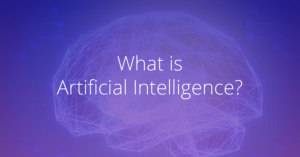What is AI ?
According to John McCarthy ( One of the founder of area of AI) " It is the science and engineering of making intelligent machines, especially intelligent computer programs. It is related to the similar task of using computers to understand human intelligence, but AI does not have to confine itself to methods that are biologically observable."
Read full article : WHAT IS ARTIFICIAL INTELLIGENCE? John McCarthy -2004
you might not be understand above statement . So lets see some example ,
Do you use Google Maps? How to find easiest routes and avoid traffic. It's AI . Google Map find possible routes and consider traffic status in the road then show best routes for you.
Tesla Self Driving car is another superb example for AI
AI History
So now you have fair understand about AI. Lets find out history of AI.
1950: Alan Turing publishes Computing Machines and Intelligence. In the newspaper offers an answer to the question, "Can machines think?" And it introduces the Turing test to determine if a computer can have the same intelligence as a human. Since then, the value of the Turing test has been debated.
1956: John McCarthy introduce the term "artificial intelligence" at the very first conference on artificial intelligence at Dartmouth College. Later that year, Allen Newell, J. Shaw, and Herbert Simon developed the Logic Theorist, the first working artificial intelligence program.
1967: Frank Rosenblatt creates the Mark 1 Perceptron, the first neural network-based computer that learns through trial and error. Just a year later, Marvin Minsky and Seymour Papert publish a book called Perceptrons, which becomes both a foundational work on neural networks and, at least temporarily, an argument against future neural network research.
1980s: Neural networks that use error backpropagation for learning gain widespread acceptance in artificial intelligence applications.
1997: IBM Deep Blue defeats then-world chess champion Garry Kasparov in a chess game .
2011: IBM Watson defeats champions Ken Jennings and Brad Rutter .
2015: The Baidu Minwa supercomputer uses a special type of deep neural network called a convolutional neural network to identify and categorize images with greater precision than the average person.
2016: DeepMind's AlphaGo program, powered by a deep neural network, defeats World Go Champion Lee Sodol in a five-game match.
What is AI Winter?
Since AI concept introduce ,many people have interested about AI . Media has been publishing news with more sci-fiction approach . But sometime AI fails to give expected result or overestimate. Therefore people interest about AI and funding had reduced. for that period called as "AI Winter". Two AI winters can be identify in past decades .Lets discuss history of AI Winter.
In addition to above reasons, There wa
History of AI Winter
First AI Winter -1974-1980
Now you have understand about AI winter . Lets discuss what were reasons behind the first AI winter.
Leading scientists were expected AI become more powerful very short period. Also expected great success in following areas, language translation ,defeat human in chess game. But it wasn't happened. Also there was fear that AI would soon replace all human tasks. it hasn't been happened until now.
In addition to above reasons, following incident caused for first AI Winter.
Two American institutes ( Advanced Research Projects Agency (ARPA) ,U.S. Defense Department (later renamed to DARPA)) had reduced AI researchers funds. That decision was taken by administration because they had failed to deliver on most of their promises.
Second AI Winter -1987-1994
Expert system became more popular in 1980. Expert systems were implemented various fields. Such as financial planning , medical diagnosis, geological exploration. But this expert system maintenance cost was very high .Also Jon Macrthy criticized expert system due to their lack of common sense and unable to understand their limitations.
According aforesaid facts, led to reduce in funding AI research. Also general interest had declined. Many AI companies collapsed during this period.



